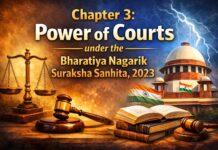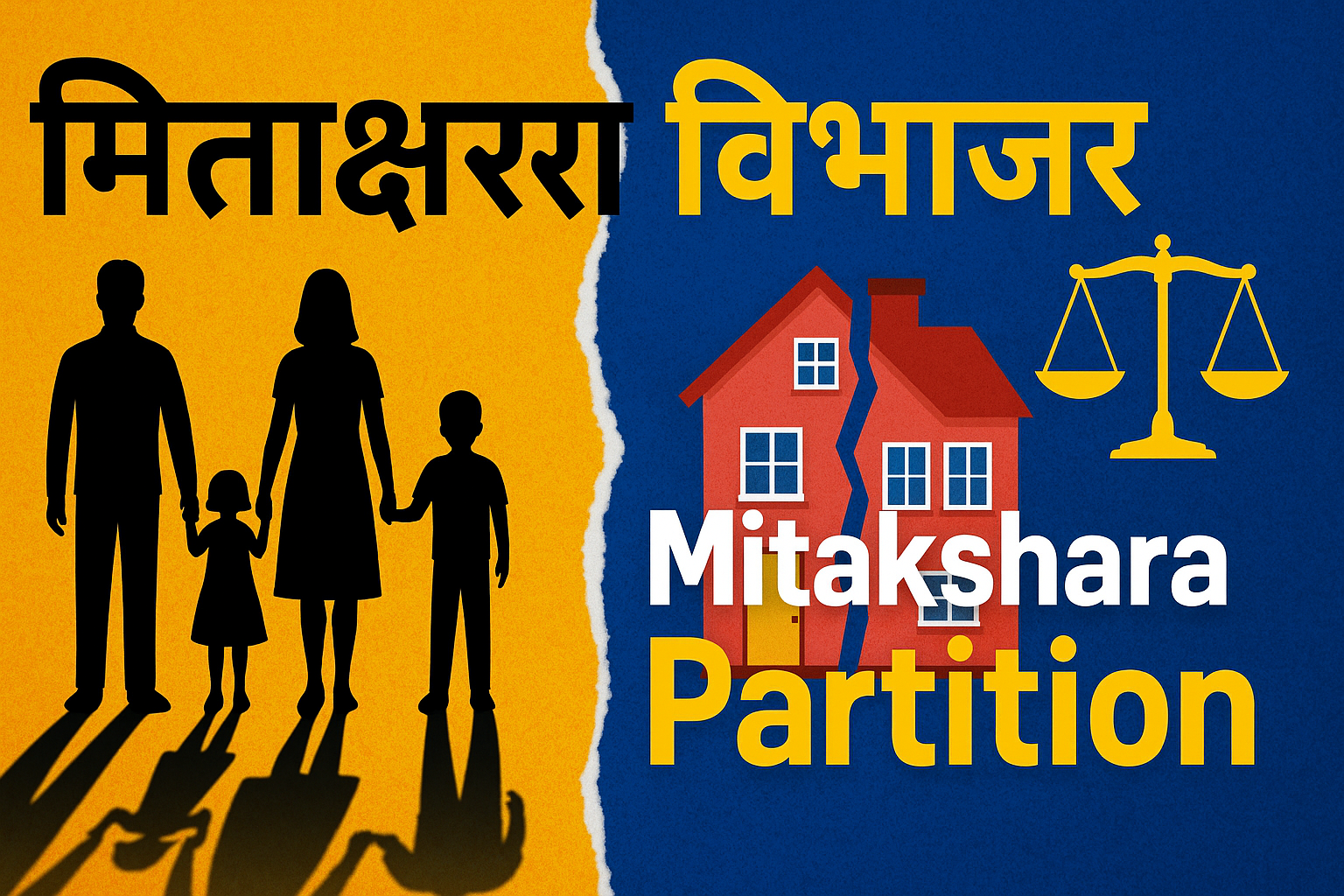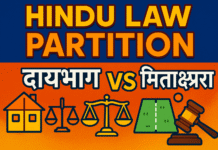Discuss the partition according to Mitakshara law ? How can it be effected.
Discuss the properties which are liable to be partitioned?
Who are entitled to a share in a partition? Whether a partition be re-opened. Discuss.
Partition Under Hindu Law: Mitakshara School – A Comprehensive Analysis
Partition under Hindu law represents one of the most significant aspects of joint family property management, marking the transformation from collective ownership to individual proprietorship. The Mitakshara School, which governs the majority of India, presents a distinct approach to partition that differs fundamentally from the Dayabhaga system.
Understanding Partition According to Mitakshara Law
Dual Meaning of Partition
According to Mitakshara Law, partition encompasses two distinct meanings: ipleaders+1
- “The adjustment into specific shares the diverse rights of different members according to the whole of family property”
- “The severance of the joint status with the legal consequences resulting therefrom”
Partition under Mitakshara law is defined as “the crystallization of the fluctuating interest of a coparcenary into a specific share in the joint-family estate”. Each co-owner is deemed to be the owner of the whole, in the same manner as other co-owners are also owners of the whole, with the ownership of one not excluding the co-ownership of others. This fundamental principle is known as the “doctrine of ownership in the whole of estate”. ipleaders+4
Essence of Partition: Severance of Status
According to Mayukha, “partition is only a particular condition of the mind, where intention to separate constitutes partition“. It is a process whereby a member of a joint or reunited family becomes separate and ceases to be a coparcener, transforming them into tenants in common. lawbhoomi+2
The critical distinction lies in understanding that partition is primarily about changing status rather than physical division of property. Under Mitakshara law, partition in law is complete even without physical division, as the essence lies in the severance of status which it effects. ipleaders+2
Division of Rights vs. Division of Property
According to Lord Westbury, there are two distinct stages in a Mitakshara partition: lawbhoomi
- “Division of Right”: Ascertaining and fixing, with intention to become separate, the share to which each coparcener is entitled
- “Division of Property”: Actually “marking off” and assigning portions of the erstwhile joint estate to individual coparceners in proportion to their respective shares
The first stage constitutes the legal partition, while the second represents the physical implementation. ipleaders+1
Properties Liable to Partition
Coparcenary Property Only
Only coparcenary property is liable to partition. Separate property belongs absolutely to the owner and cannot be subjected to partition. The courts have consistently held that: lawbhoomi+1
- Property acquired subsequently, even with joint funds, is regarded as self-acquired property and excluded from partition lawbhoomi
- Properties acquired after severance of joint family status cannot be clubbed into joint family properties lawbhoomi
Indivisible Properties
Certain properties are not liable to partition due to various reasons: lawbhoomi
- Impartible property: Property descending to one member only by custom, law, or grant terms
- Property indivisible by nature: Animals, furniture, etc., whose value may be determined and distributed
- Family idols and relics: Objects of worship that remain in common use
- Separate property: Belonging exclusively to individual members
According to Manu, indivisible items include “a dress, a vehicle, ornaments, cooked food, water and female slaves, property destined for pious use and sacrifices, and a pasture land”. lawbhoomi
Provisions Before Partition
Before actual partition, provisions must first be made for: lawbhoomi
- Joint family debts payable from joint property
- Personal debts of the father (not for illegal/immoral purposes)
- Maintenance of dependent females and disqualified heirs
- Marriage expenses of unmarried daughters of the last male holder
- Funeral ceremony expenses for widow and mother of the last male holder
Persons Entitled to Demand Partition
Primary Coparceners
Sons, Grandsons, and Great-Grandsons
Under Mitakshara Law, sons, grandsons, and great-grandsons, as well as every other adult male coparcener, have the fully settled right to demand partition even against the consent of others. However, the Bombay High Court established that a son cannot demand partition during his father’s lifetime without consent when the father is not already separate from his own father, brothers, or nephews. ipleaders+1
After-born Sons
After-born sons are categorized into two types: jurisinsider+1
- Sons born and begotten after partition: If the father has reserved a share, the after-born son is entitled only to the father’s share and separate property, not entitled to reopen partition
- Sons in mother’s womb at partition: Treated as existing in law and entitled to reopen partition to receive an equal share with brothers if no share was reserved jurisinsider+1
Illegitimate Sons
Illegitimate sons among the three regenerate classes have no vested interest and cannot demand partition but are entitled to maintenance. However, Madras and Allahabad High Courts held that illegitimate sons of Sudras may enforce partition against legitimate brothers but not against father or father’s coparceners. lawbhoomi
Female Members and Modern Developments
Traditional Female Sharers
Female sharers traditionally include: cdnbbsr.s3waas+1
- The wife
- Widowed mother
- Paternal grandmother
These female sharers cannot demand partition nor claim share upon mere severance of joint-family status. They are entitled to their share only when joint-family property is actually divided – not on every partition, but on some partitions only. cdnbbsr.s3waas+1
Revolutionary Changes: Hindu Succession Amendment Act 2005
The 2005 Amendment fundamentally transformed women’s rights: lawfinderlive+1
- Daughters now become coparceners by birth in the same manner as sons cleartax+1
- They have equal rights to demand partition and receive equal shares ipleaders+1
- Section 23 was omitted, which previously disentitled female heirs from demanding partition of dwelling houses lawfinderlive
- The amendment has retrospective effect, benefiting daughters born before 2005 cleartax+1
Other Entitled Parties
Widows
Under the Hindu Women’s Right to Property Act, 1937, and later under Section 23 of the Hindu Succession Act, widows can claim partition of the joint estate. Importantly, partition between widows does not destroy survivorship rights to properties allotted to each other. nujs+1
Alienees and Purchasers
Alienees of coparcener’s interest, where alienation is valid, have the right to partition. The Supreme Court in Smt. Kailashpati Devi vs. Smt. Bhuvaneshwari Devi held that purchasers of joint-family property may file general partition suits against joint family members. edumound+1
The execution-purchaser of a member’s interest in Bombay and Madras is entitled to demand partition in the rights of that member. However, such purchasers do not acquire right to joint possession – their proper remedy is partition. lawbhoomi+4
Adopted Sons
Adopted sons are treated as natural-born sons and entitled to demand partition anytime after adoption. Where both adopted and natural sons exist, the quantum of shares may differ in different schools, though both are treated equally in principle. cdnbbsr.s3waas+1
Methods of Effecting Partition
Primary Methods
1. Partition by Mere Declaration to Separate
Partition under Mitakshara is a matter of individual volition. All that is necessary is a “definite and unequivocal indication of intention” by a joint-family member to separate and enjoy his share in severalty. Filing a partition suit is a clear expression of such intention. lawbhoomi+3
2. Partition by Notice
Severance may be effected by serving notice on other coparceners, indicating intention to separate and enjoy property in severalty or demanding partition. The notice may be subsequently withdrawn with consent of other coparceners, preventing partition. ipleaders+1
3. Partition by Will
Partition may be effected by making a will containing clear and unequivocal intimation of desire to sever from the joint family or asserting right to separate. ipleaders+1
4. Conversion to Another Religion
Conversion of a coparcener to any other religion operates as partition of joint status between him and other family members. ipleaders+1
5. Marriage Under Special Marriage Act, 1954
Marriage under the Special Marriage Act causes severance between the person and other family members. ipleaders+1
6. Partition by Agreement
An agreement between joint family members to hold and enjoy property in defined shares as separate owners operates as partition, even without actual physical division. ipleaders+1
7. Partition by Arbitration
An agreement appointing an arbitrator to divide property operates as partition from the date thereof, regardless of whether an award has been made. ipleaders+1
8. Partition by Father
The father may cause severance of sons without their consent. This is a remnant of the ancient doctrine of “Patria Potestas” (Paternal power). ipleaders+1
9. Partition by Suits
The institution of a partition suit ipso facto effects severance of joint-family status, causing immediate severance regardless of the suit’s outcome. ipleaders+2
Non-Exhaustive Nature
The nine modes listed above are not exhaustive. Any circumstances indicating unequivocal intention for partition will be admissible for establishing partition. lawbhoomi+2
Reopening of Partition
General Rule of Irrevocability
According to Manu: “Once is partition made, once is a damsel given in marriage, once does a man say, ‘I give’ – these are by good men done for all and irrevocable”. The general rule under Hindu law is that partition once made cannot be reopened. linkedin+2
The Supreme Court in Smt. Lila Wad vs. Paras Ram held that where partition is evidenced by mutation, it severs joint status even if motivated to defeat creditors’ claims. Partition once proved, even with ulterior motives, remains binding on family members. lawbhoomi
Exceptions: When Partition Can Be Reopened
1. Sons in Mother’s Womb
A son conceived at partition time, though not born before partition, can reopen it if no share was reserved. However, a son begotten and born after partition cannot reopen partition if father took a share – he is entitled only to father’s share and separate property. cdnbbsr.s3waas+3
2. Disqualified Coparceners
A disqualified coparcener after removal of disqualification or a missing coparcener upon return can reopen partition. cdnbbsr.s3waas+2
3. Minor Coparceners
A minor coparcener upon attaining majority can reopen partition if it was unfair or prejudicial to his interests. The Supreme Court has held that partition can be reopened by minors regardless of fraud, if the division was unequal or detrimental to minor’s interests. iilsindia+3
4. Fraudulent Partitions
Where a coparcener obtained unfair advantage through fraud, coercion, misrepresentation, or undue influence, partition may be reopened for readjustment. linkedin+2
5. Adopted Sons
If a coparcener’s widow adopts a son after partition, the adopted son can reopen partition as adoption relates back to the deceased husband’s death date under HAMA 1956. cdnbbsr.s3waas+1
6. Absentee Coparceners
A coparcener absent during partition who received no share allocation can reopen partition upon return. iilsindia+2
7. Mistake and Additional Property
Partition can be reopened for property mistakenly left out during original partition, or when additional property surfaces after partition. lawbhoomi+2
Supreme Court Guidelines
The Supreme Court in Ratnam Chettiar vs. S.M. Kuppu Swami established that partition effected by family members’ own volition and consent cannot be reopened unless obtained by fraud, coercion, misrepresentation, or undue influence. When the undivided family consists of minors and partition is proved unjust and detrimental to minor’s interests, it can be reopened regardless of time elapsed. lawbhoomi
Modern Legal Framework and Recent Developments
Hindu Succession Act 2005: Revolutionary Changes
The Hindu Succession (Amendment) Act, 2005 brought about paradigmatic shifts in partition rights: ipleaders+2
- Gender Equality: Daughters receive equal coparcenary rights as sons, including equal partition rights cleartax+1
- Retrospective Application: Benefits daughters born before 2005 ipleaders+1
- Dwelling House Rights: Section 23 deletion removed restrictions on female heirs demanding partition of dwelling houses lawfinderlive
- Testamentary Powers: Women granted equal rights to dispose property by will cleartax
Vineeta Sharma vs. Rakesh Sharma Impact
Recent Supreme Court judgments have further clarified that daughter’s coparcenary rights exist regardless of father’s living status on September 9, 2005, cementing gender equality in property rights. lawfinderlive
Contemporary Judicial Interpretations
Modern courts continue to balance traditional joint family values with individual rights, ensuring that partition serves both family welfare and individual justice. The emphasis remains on intention and equitable distribution while protecting vulnerable family members’ interests.
Conclusion
Partition under Mitakshara law represents a sophisticated legal framework that balances individual autonomy with family cohesion. The system’s emphasis on “severance of status” over mere property division reflects deep philosophical understanding of joint family dynamics. lawbhoomi+3
The 2005 Amendment’s gender-neutral approach has fundamentally transformed partition law, creating a more equitable system that recognizes women’s equal status in family property matters. However, the core Mitakshara principles – unity of ownership, intention-based partition, and flexible reopening provisions – continue to provide stability and justice in family property disputes. bhattandjoshiassociates+4
The non-exhaustive nature of partition methods and the carefully crafted exceptions for reopening demonstrate the law’s adaptability to diverse family circumstances. Whether through mere declaration, formal agreements, or judicial intervention, Mitakshara law ensures that partition serves the ultimate goal of fair and equitable property distribution while maintaining family harmony wherever possible. lawbhoomi+3
As Indian society continues to evolve, the Mitakshara partition framework provides a robust foundation for addressing contemporary family property challenges while honoring traditional values of joint family living and mutual responsibility. ipleaders+1
- https://blog.ipleaders.in/critical-analysis-partition-hindu-law/
- https://blog.ipleaders.in/hindu-law-of-partition/
- https://bhattandjoshiassociates.com/understanding-coparcenary-joint-ownership-and-birth-rights-in-hindu-ancestral-property/
- https://blog.ipleaders.in/reopening-of-partition/
- https://lawbhoomi.com/mitakshara-and-dayabhaga-schools/
- https://jurisinsider.in/what-you-need-to-know-about-partition-rights-under-hindu-family-law/
- https://cdnbbsr.s3waas.gov.in/s3ec03333cb763facc6ce398ff83845f22/uploads/2024/03/2024031443.pdf
- https://www.lawfinderlive.com/Articles-1/Article94.htm
- https://blog.ipleaders.in/critical-analysis-hindu-succession-amendment-act-2005/
- https://cleartax.in/s/hindu-succession-act
- https://housing.com/news/these-are-the-property-rights-of-a-daughter-in-a-hindu-family/
- https://www.nujs.edu/wp-content/uploads/2023/07/9.pdf
- https://edumound.com/study-material/law/persons-entitled-to-demand-partition-in-hindu-joint-family/
- https://lawbhoomi.com/alienation-of-coparcenary-property-in-hindus/
- https://cdnbbsr.s3waas.gov.in/s3ec015a01f0597ac4bdf35c24846734ee/uploads/2024/03/2024031824.pdf
- https://www.lawweb.in/2014/09/date-from-which-purchaser-of-joint.html
- https://lawbhoomi.com/reopening-and-reunion-of-partition-under-hindu-law/
- https://www.linkedin.com/pulse/partition-hindu-joint-family-property-edge-law-partners
- https://cdnbbsr.s3waas.gov.in/s3ec01a0ba2648acd23dc7a5829968ce53/uploads/2024/03/2024032251.pdf
- https://www.iilsindia.com/study-material/125112_1621609964.docx
- https://www.casemine.com/commentary/in/reopening-partition-of-ancestral-property-by-minor-coparcener:-insights-from-smt-sukhrani-v.-hari-shanker/view
- https://www.casemine.com/search/in/son+born+after+partition
- https://www.slideshare.net/slideshow/partition-laws-in-india/173246495
- https://academic.oup.com/book/26921/chapter/196036310
- https://www.youtube.com/watch?v=jwKh525V7hA
- https://ncwapps.nic.in/acts/TheHinduSuccessionAct1956.pdf
- https://www.cambridge.org/core/books/two-treatises-on-the-hindu-law-of-inheritance/participation-of-sons-born-after-a-partition/8724D37E51BDABA588916F7424988565
- https://thelegalschool.in/blog/difference-between-mitakshara-and-dayabhaga
- https://gyansanchay.csjmu.ac.in/wp-content/uploads/2023/10/PARTITION-UNDER-HINDU-LAW.pdf
- https://www.scribd.com/doc/79273496/Mitakshara-Hindu-Law
- https://thelawbrigade.com/wp-content/uploads/2019/07/Tanvi-Menon.pdf
- https://www.allahabadhighcourt.in/event/changingdimensionshindusect620112021.pdf
- https://blog.ipleaders.in/the-hindu-succession-act-1956/
- https://api.sci.gov.in/supremecourt/2022/10885/10885_2022_13_1502_60907_Judgement_22-Apr-2025.pdf
- https://ijalr.in/volume-3/issue-1/suit-for-partition-how-it-is-affected-reopening-and-reunion-in-partition-by-pavitra-somani/
- https://blog.ipleaders.in/alienation-of-coparcenary-property-everything-you-need-to-know/
- https://www.lawyersnjurists.com/article/grounds-for-partition/
- https://www.plrs.org.in/pdfs/Hindu%20Succession%20Act.pdf














